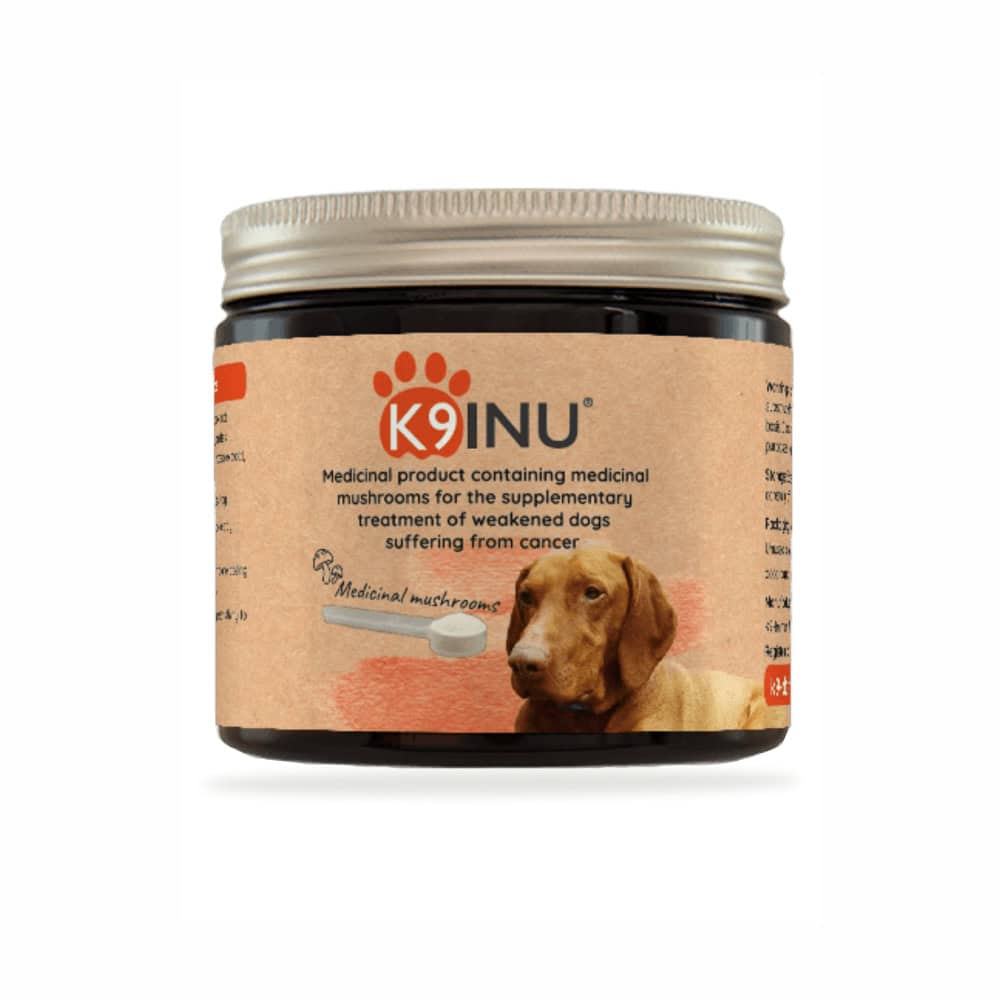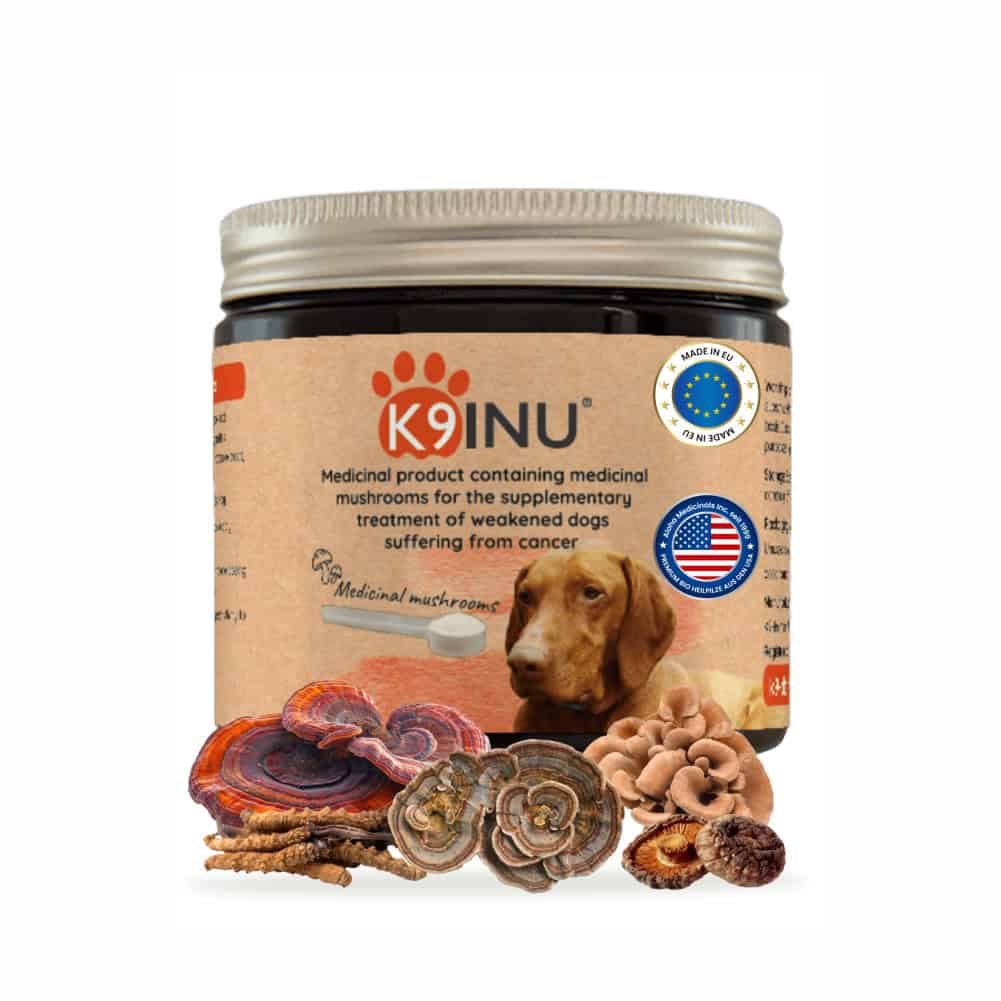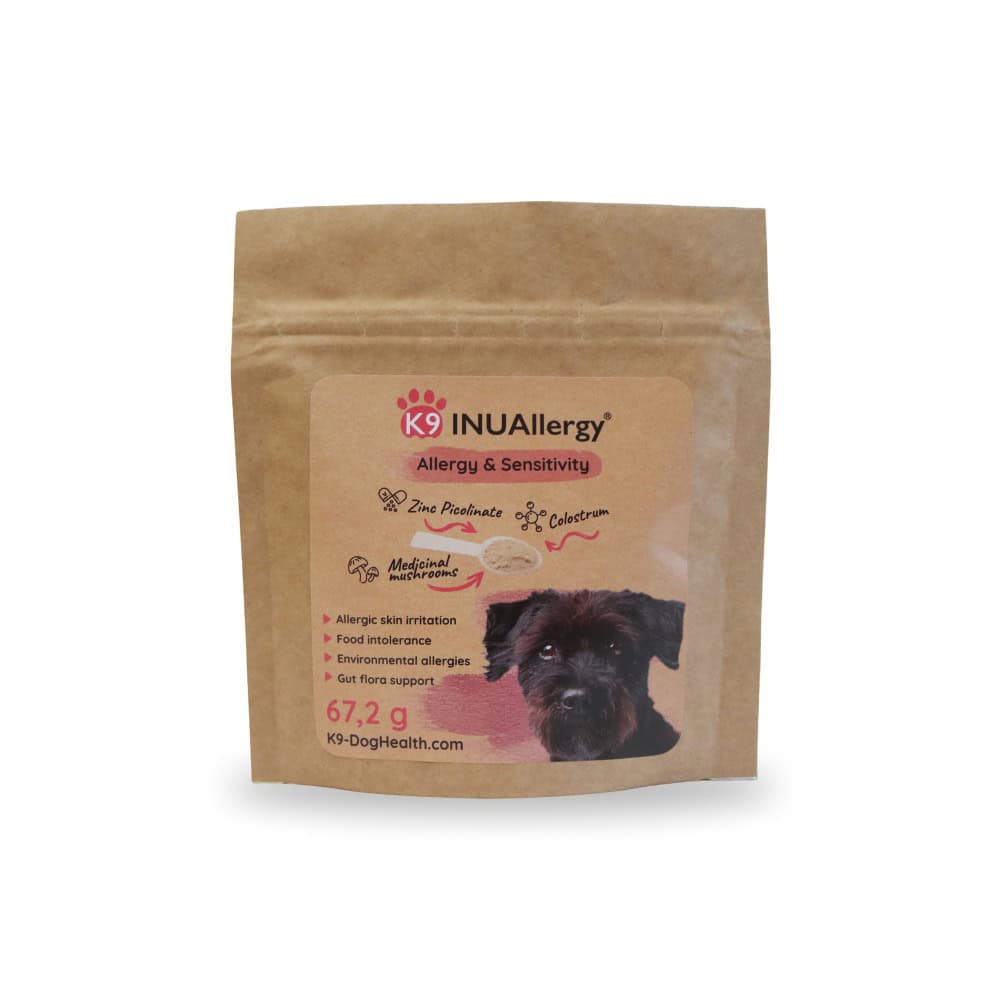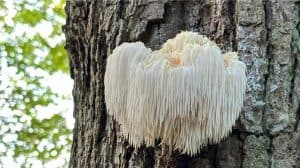Reishi mushroom for dogs – The comprehensive effects of ganoderma
Among natural medicinal mushrooms, the reishi mushroom (Latin name Ganoderma lucidum, also known as reishi) is one of the most famous and most extensively researched species. In traditional Chinese medicine it has been used for thousands of years as the “mushroom of immortality,” and modern science is now uncovering more and more evidence that the reishi mushroom for dogs can also support health in many ways. In addition to its immune-modulating, anti-inflammatory, anti-tumor, and liver-protective properties, it also works as an adaptogen, helping the body adapt to different stressors.
What is the reishi mushroom?
-
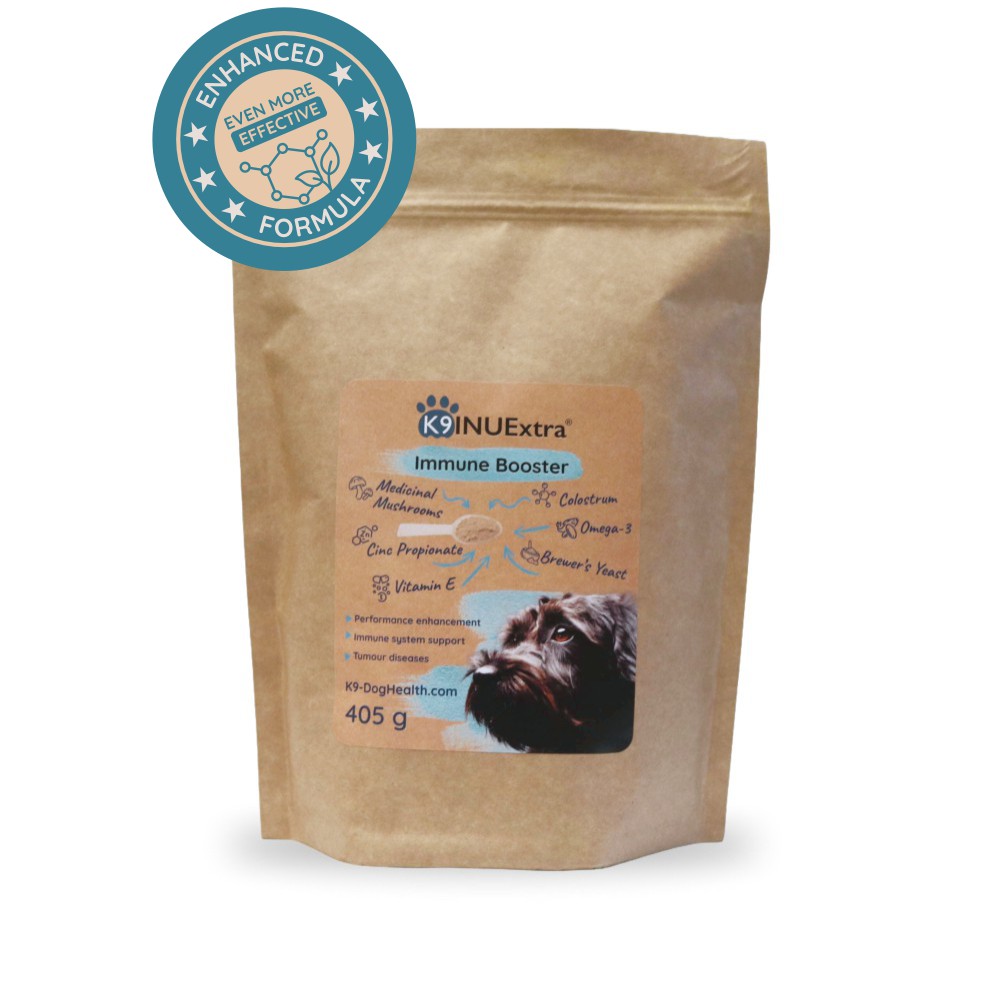

K9 INUExtra®
- Premium immune support with medicinal mushrooms and colostrum
- Anti-inflammatory support with curcumin, omega-3 and BioPerine
- Stronger gut flora and improved digestion with brewer’s yeast and targeted prebiotics
- Antioxidant cellular protection with vitamin E, zinc and natural active compounds
€64,93 (ex.VAT)
The reishi mushroom is a hard, varnish-like polypore that typically grows on tree trunks and stumps. In Asia, it was revered as sacred because it was believed to prolong life and boost energy. In recent decades, research on Ganoderma lucidum has focused on its triterpenoids, polysaccharides (especially beta-glucans), and antioxidant compounds, which can also produce beneficial physiological effects in dogs.
Scientific evidence
The active compounds of the reishi mushroom have shown immune-modulating and anti-tumor potential in numerous studies. In human clinical trials, ganoderma extracts improved the well-being of patients undergoing chemotherapy by enhancing immune response and reducing side effects. Although the number of studies in dogs is still limited, animal experiments have demonstrated that ganoderma polysaccharides can stimulate the activity of macrophages, NK cells, and T-lymphocytes, thereby supporting the anti-tumor immune response.
Which health areas can the reishi mushroom support?
The reishi mushroom for dogs may provide natural complementary support in many areas. It is most sought after for its dog immune health, but its liver-protective, cardiovascular, and neuroprotective properties are also noteworthy.
Immune-modulating effect – more than “boosting”
Most people think of immune support as automatically “boosting” it. The reishi mushroom (Ganoderma lucidum) does not simply strengthen but rather regulates the immune response. If the body is too weak, it activates defense cells, while if it is overactive (as in allergies or autoimmune diseases), it can calm down the excessive activity. This fine-tuning is what makes it unique.
Supporting cancer therapy
Ganoderma polysaccharides have been proven to have anti-cancer effects in several laboratory and animal studies. These compounds may enhance the immune response against tumor cells, reduce the formation of metastases, and improve the effectiveness of chemotherapy treatments. In dogs, the use of the reishi mushroom may be especially useful in complementary cancer therapy for dogs, in combination with veterinary treatment.
Allergy symptom relief
Reishi can be especially beneficial for dogs with allergies, as it helps calm an overactive immune response in a natural way. Its active compounds – particularly triterpenoids – may help stabilize mast cells, leading to reduced histamine release and milder itching, redness, or irritation. In addition, the polysaccharides found in Ganoderma support the balance of the gut microbiome, which plays an important role in reducing food sensitivities and chronic digestive-related allergic reactions.
Liver and heart protection
Several studies mention the reishi mushroom as a natural protector of the liver. Its triterpenoids and antioxidants may help reduce elevated liver enzymes and protect liver cells from toxin-induced damage. In addition, the reishi mushroom may help regulate blood pressure and cholesterol levels, thereby supporting cardiovascular health – which is especially important in older dogs.
Gut flora and microbiome support
The polysaccharides of the reishi mushroom act as natural prebiotics, feeding the beneficial bacteria in the gut. Strengthening the microbiome in this way indirectly enhances immune defense. A balanced gut flora not only affects digestion but also the health of the skin and immune system – which is why long-term use of ganoderma can contribute to the overall vitality of the dog.
Stress, sleep, and nervous system support
Less known is that the reishi mushroom may also have calming effects. International literature increasingly suggests that reishi extracts may support sleep quality, reduce anxiety, and help manage chronic stress. This can also benefit dogs: for example, in cases of noise sensitivity, separation anxiety, or age-related restlessness.
Metabolic balance and metabolic health
International studies suggest that the reishi mushroom may help regulate blood sugar and cholesterol. This effect can be particularly important in overweight or diabetic dogs. Although animal experiments have produced promising results, it is always important to use dietary supplements as a complement to, and not as a replacement for, veterinary therapy.
Skin and coat health
Rich in antioxidants, reishi can help protect the skin against oxidative stress, reduce allergic reactions, and promote a shiny coat. Owners often report that after longer-term use of the reishi mushroom, their dog’s skin and coat appear healthier.
The adaptogenic properties of the reishi mushroom
Adaptogens help the body adapt to changing conditions, whether it be infections, physical strain, or emotional stress. As an adaptogen, the reishi mushroom may help maintain hormonal balance and regulate stress hormones such as cortisol. This can be particularly valuable in senior dogs or animals with chronic diseases.
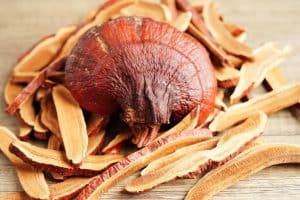
Drug interactions – what to watch for
The reishi mushroom is generally safe, but it may interact with some medications. The mushroom can affect blood clotting, so if your dog is taking blood thinners or other medication, always consult your veterinarian before use. Long-term or high-dose use should also be discussed with a professional.
Dosage and safety
Reishi mushroom extract for dogs is usually available in powder form, which can be mixed into food. Dosage depends on body weight and condition, but the general recommendation is 10–20 mg per kilogram of body weight per day. The mushroom is well tolerated, and side effects are rare. In rare cases, mild digestive upset (loose stools) may occur, which usually resolves with a reduced dose.
Reishi mushroom for dogs (Ganoderma lucidum) – Summary
The reishi mushroom is one of the most valuable medicinal mushrooms, and it offers versatile support for dogs as well. Thanks to its immune-modulating, liver- and heart-protective, anti-tumor, anti-inflammatory, gut-supporting, and adaptogenic properties, it may therefore contribute to your dog’s long-term health and overall vitality.
Although it does not replace veterinary care, it can play an important role as a natural supplement in modern veterinary medicine.
Always consult your vet before use – but reishi mushroom may be the natural support your dog needs for a healthier, more vibrant life.
Related medicinal mushrooms for dogs – Natural ways to support canine health
While reishi is one of the most respected medicinal mushrooms, it is not the only one with proven health benefits. In fact, several other species have also been widely studied for their positive effects on dogs. Lion’s mane, for example, is a remarkable medicinal mushroom for dogs that can help maintain nervous system balance, support digestion, and strengthen immune defenses. Below are a few other mushrooms worth exploring.
- Lion’s mane (Hericium erinaceus) mushroom for dogs – supports the brain, gut, and overall nervous system
- Turkey tail (Trametes versicolor) mushroom for dogs – enhances immune response and aids cancer recovery
- Cordyceps – a revitalizing mushroom that boosts energy and respiratory function
- Agaricus blazei Murill – valued for its immune-modulating and anti-inflammatory properties
- Shiitake (Lentinula edodes) mushroom for dogs – helps protect cardiovascular health and offers antioxidant support
- Maitake (Grifola frondosa) mushroom for dogs – promotes balanced blood sugar and immune resilience
Together, these functional mushrooms deliver a wide spectrum of bioactive compounds such as β-glucans, triterpenes, and polysaccharides. When used in the right combination, they can naturally boost your dog’s vitality, enhance immune performance, and contribute to long-term wellness.
Recommended:
If you are interested in other medicinal mushrooms, read our articles on the turkey tail mushroom or the shiitake mushroom. If you would like to know how truly high-quality medicinal mushrooms are produced or how natural immune support for dogs work, these articles are also worth checking out.
Important: This article is for informational purposes only and is not a substitute for veterinary examination or treatment. Always consult your veterinarian for an accurate diagnosis and appropriate therapy.
References:
- Jin, X., Ruiz Beguerie, J., Sze, D. M.-Y., Chan, G. C.-F. (2016). Ganoderma lucidum (Reishi mushroom) for cancer treatment. Cochrane Database of Systematic Reviews, 2016(4):CD007731.
- Wachtel-Galor S, Yuen J, Buswell JA, Benzie IFF. (2011). Ganoderma lucidum (Lingzhi or Reishi): A Medicinal Mushroom. In: Herbal Medicine: Biomolecular and Clinical Aspects. 2nd edition. CRC Press.
- Boh B. (2013). Ganoderma lucidum and its pharmaceutically active compounds. Journal of Ethnopharmacology, 150(3), 805–820.
- Zhou X et al. (2019). Ganoderma lucidum polysaccharides and their potential role in modulating gut microbiota. Biomedicine & Pharmacotherapy, 118, 108709.
- Martínez-Montemayor MM et al. (2011). Ganoderma lucidum extract reduces mammary tumor growth and metastasis through inhibition of Akt/NF-κB signaling. Food and Chemical Toxicology, 49(8), 1707–1715.
